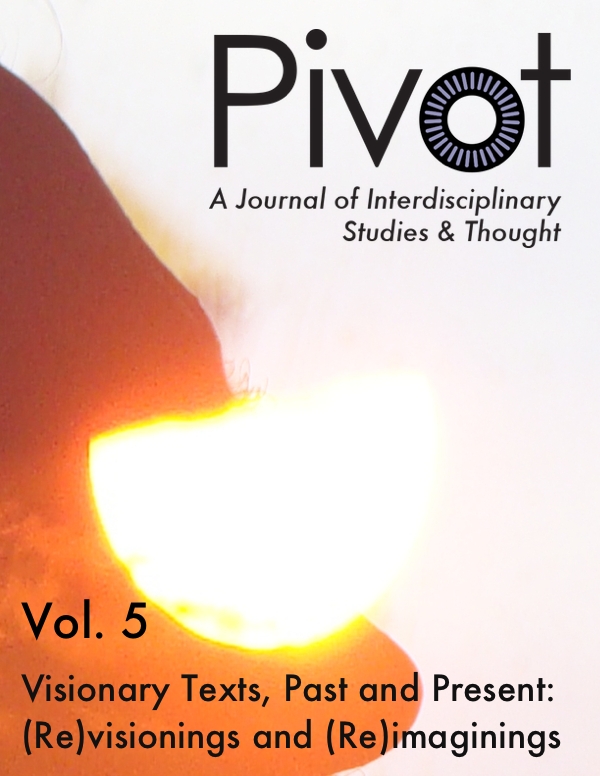Postmodern Chic and Postcolonial Cheek: A Map of Linguistic Resistance, Hybridity, and Pedagogy in Rushdie’s Midnight’s Children
DOI:
https://doi.org/10.25071/2369-7326.40282Abstract
This essay examines how Salman Rushdie appropriates the colonial linguistic medium (English) in Midnight’s Children and embeds resistance within its commonplace and seemingly innocent lexical interstices through the insertion of Hindi/Urdu terms in his wordplay. This lexical hybridity may be examined as a creative example of Homi Bhabha's exegetical “third space” that is postmodern in its disruption of semiotic stasis and postcolonial in its disruption of the primacy of English. This paper contextualizes Rushdie’s code-mixing of English and Hindi/Urdu lexical registers to produce multiple meanings and puns, maps select examples through L.G. Heller’s mode of linguistic diagramming, and provides an overview of the resultant ideological considerations.References
Ashcroft, Bill. "Constitutive Graphonomy." Ashcroft, Griffiths, and Tiffin, Post-Colonial 298-302.
Ashcroft, Bill, Gareth Griffiths, and Helen Tiffin. Introduction. "Part IV: Postmodernism and Post-Colonialism." Ashcroft, Griffiths, and Tiffin, Post-Colonial 117-18.
Ashcroft, Bill, Gareth Griffiths, and Helen Tiffin, eds. The Empire Writes Back. London: Routledge, 1989. Print. https://doi.org/10.4324/9780203402627
Ashcroft, Bill, Gareth Griffiths, and Helen Tiffin. The Post-Colonial Studies Reader. London: Taylor & Francis, 2006. Print.
Bassnett, Susan and Harish Trivedi, eds. Post-Colonial Translation: Theory and Practice. London and New York: Routledge, 1999. Print. https://doi.org/10.4324/9780203068878
Bhabha, Homi K. The Location of Culture. London: Routledge, 1994. Print.
Bongartz, Christiane, and Esther Gilman Richey. "Checkmate: Linguistic and Literary Play in Salman Rushdie's Haroun and the Sea of Stories." American Journal of Play 2.4 (2010): 452-70. Print.
Brennan, Timothy. Salman Rushdie and the Third World: Myths of the Nation. London: Macmillan, 1989. Print. https://doi.org/10.1007/978-1-349-20079-5
Easthope, Antony, and Kate McGowan. Introduction. "Section 6: Postmodernism." A Critical and Cultural Theory Reader. Ed. Antony Easthope and Kate McGowan. Toronto: U of T Press, 2004. Print.
Gandhi, Leela. Postcolonial Theory: A Critical Introduction. Crows Nest: Allen and Unwin, 1998. Print.
Heller, Louis G. "Toward a General Typology of the Pun." Language and Style 7.4 (1974): 271-82. Print.
Kachru, Braj B. "World Englishes: Agony and Ecstasy." Journal of Aesthetic Education 30.2 (1996): 135-55. https://doi.org/10.2307/3333196
Macaulay, Thomas. "Minute on Indian Education." Ashcroft, Griffiths, and Tiffin, Post-Colonial 428-30.
Moore-Gilbert, Bart, ed. Writing India, 1757-1990: The Literature of British India. Manchester and New York: Manchester UP, 1996. Print.
Parnell, Tim. "Salman Rushdie: From Colonial Politics to Postmodern Poetics." Moore-Gilbert 236-62.
Prasad, G.J.V. "Writing Translation." Bassnett and Trivedi 41-57.
Rege, Josna E. "Victim into Protagonist? Midnight's Children and the Post-Rushdie National Narratives of the Eighties." Studies in the Novel 29.3 (1997): 342-75. Print.
Rushdie, Salman. Imaginary Homelands: Essays and Criticism 1981-1991. New York: Penguin, 1991. Print.
Rushdie, Salman. Midnight's Children. London: Picador, 1981. Print.
Rushdie, Salman. "Midnight's Children and Shame." Kunapipi 7.1 (1985): 1-19. Print.
Rushdie, Salman. Shame. Toronto: Vintage, 1983. Print.
Sharpe, Jenny. "Figures of Colonial Resistance." Ashcroft, Griffiths, and Tiffin, Post-Colonial 99-103.
Singh, Rajendra, and Rama Kant Agnihotri. Hindi Morphology: A Word-Based Description. Delhi: Motilal Banarsidass, 1997. Print.
Slemon, Stephen. "Unsettling the Empire: Resistance Theory for the Second World." Journal of Postcolonial Writing 30.2 (1990): 30-41. Print. https://doi.org/10.1080/17449859008589130
Tiffin, Helen. "Post-Colonial Literatures and Counter-Discourse." Ashcroft, Griffiths, and Tiffin, Post-Colonial 95-98.
Traugott, Elizabeth C., and Mary L. Pratt. Linguistics for Students of Literature. New York: Harcourt 1980. Print.

